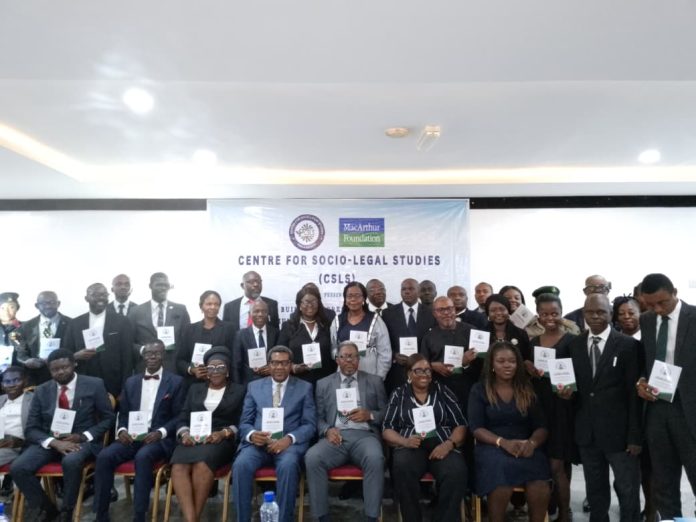BY RITA OYIBOKA
Building on its national lead in the implementation of the Administration of Criminal Justice Law (ACJL), with a 90.9 per cent compliance score, Delta State has committed to deepening reforms to ensure swifter, fairer, and more uniform justice delivery across Nigeria.
This renewed commitment was made at a one-day capacity-building workshop in Asaba, organised by the Centre for Social and Legal Studies (CSLS) with support from the MacArthur Foundation.
The session brought together judges, lawyers, law enforcement agencies, and other relevant stakeholders to examine the National Minimum Standards (NMS), a benchmark aimed at harmonising how states implement the Administration of Criminal Justice Act (ACJA) and their own ACJLs.
Speaking on behalf of the CSLS Executive Director, Prof. Yemi Akinseye-George, Executive Assistant Oyinloye Opajobi stressed the need for consistency nationwide.
“We can’t claim to have a fair justice system if the same crime attracts different punishments in different states. The NMS sets the baseline. States can go above it, but not below it,” he said, noting that the framework covers pre-trial, trial, and post-trial processes.
Delta’s influence on other states’ criminal justice laws was also highlighted, with some of its provisions exceeding even those in the federal ACJA.
But Prof Akinseye-George cautioned that ten years after the ACJA came into force, gaps in enforcement remain, calling for a more pragmatic approach and healthy inter-state competition to drive improvements.
Meanwhile, the Chairman of Delta’s ACJL Monitoring Committee, Justice Godwin Briki-Okolosi, shared real-life case examples revealing misinterpretations of the law by legal practitioners and enforcement officers.
He stressed the urgent need for more targeted training across the justice sector, from magistrates to prosecutors and correctional staff.
“Synergy among all operators of this law is non-negotiable. Everyone, from the bench to the correctional service, must understand their role if justice is to be truly corrective, not punitive,” he said.
The Ministry of Justice, represented by Director of Public Prosecutions Anthony Orhorhoro, pointed to tangible progress. Delta’s inmate population dropped from 2,399 in March 2022 to 1,245 in July 2025, aided by measures such as virtual court hearings now operational in custodial centres in Ogwashi-Uku and Warri.
“Our adoption of the ACJL in 2016 and its amendment in 2022 show our resolve. We are passionate about meeting, and even surpassing, the national minimum standards,” Orhorhoro said.
Director of the Office of the Public Defender, Ernest Edomwoni, emphasised that laws must go beyond “ink on paper” to deliver justice that is accessible to all, regardless of status.
“When one link in the justice chain is weak, the whole system suffers. This workshop is our chance to strengthen those links and restore public trust,” he said.
The workshop featured plenary and interactive sessions where stakeholders discussed practical strategies for uniform law enforcement, reducing pre-trial detentions, expanding legal aid, and strengthening monitoring mechanisms.


